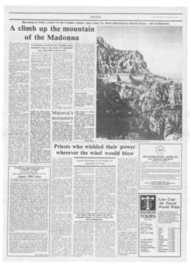Page 1, 31st August 1990
Page 1

Report an error
Noticed an error on this page?If you've noticed an error in this article please click here to report it.
Tags
Share
Related articles
Cardinal Backs Use Of 'last Resort' Force
Poll Backing For Comiskey
Ohn Paul Ii Summons Irish Bishop
Comiskey Misses Crunch Meeting
Embargo Criticised
Irish bishops question Iraq embargo
by Deidre Murphy in Dublin TWO Irish bishops have attacked the imposition of the UN economic embargo on Iraq which threatens "to starve 17 million people into submission. Bishop Brendan Comiskey of Ferns has endorsed the plea of Bishop Thomas Finnegan of Killala that food should not be included in the blockade of Iraq.
In a statement produced after talking to people in his diocese who have relatives in the crisisstricken Gulf region, Bishop Finnegan pointed out that the Universal Declaration of Human Rights recognises the dignity of every human being and the universal, inviolable and inalienable rights which stem from that dignity. By denying Iraq and thus all those in that country food by its blockade, the United Nations is "in danger of betraying the fundamental values enshrined in the very charter which formed the basis of the condemnation of Saddam Hussein" the bishop said.
Endorsing Bishop Finnegan's warning to the western forces in the Gulf, Bishop Brendan Comiskey recalled a time when the world would have responded to such an international crisis with "an outpouring of prayers". Today, by contrast, the bishop said, "men with keen long faces prepare us for Armageddon with talk of 'inevitable war'. In the midst of all this, the majority of those in whose hands the people of the world have placed their lives, that is governments, parliaments, politicians, remain on holidays".
Christians should not be paralysed, "transfixed by the mad gambolling of the power hungry", Bishop Comiskey said. "Nothing is inevitable for the Christian. Last night I was asked on local radio whether there was going to be war in the Gulf and I said `No!' You know why I said no? Because we are going to stop it by prayer. We and our God".
Pope John Paul II stepped up his diplomatic efforts over the Gulf crisis this week. At his summer palace at Castel
Gandolfo, south of Rome, John Paul was briefed by the nuncio in Baghdad, Archbishop Marian Oles.
The meeting was strictly private, a papal spokesperson said later, and the archbishop headed straight back for the Iraqi capital, via Jordan. The spokesperson said the archbishop did express a willingness to offer humanitarian assistance to western hostages held in Iraq and Kuwait by President Saddam Hussein.
The archbishop remained pronuncio to both countries, the spokesperson said, stressing the Vatican view that Iraq's occupation of Kuwait is illegal.
On Sunday, after his meeting with the nuncio, Pope John Paul made his first specific public reference to the Gulf ituation when he accused Iraq of "grave violations" of international law and urged prayers for the release of the western hostages in Baghdad.
The world was in a "truly serious situation". the Pontiff told visitors at Castel Gandolfo, and an atmosphere of "profound anxiety" was in the air. He urged talks to settle the dispute.
blog comments powered by Disqus











